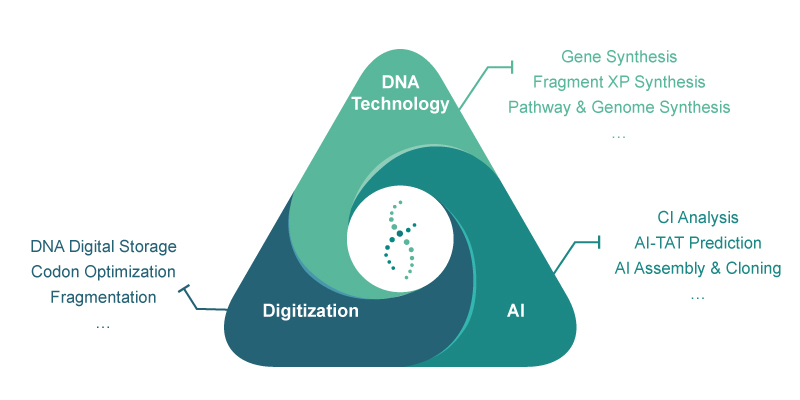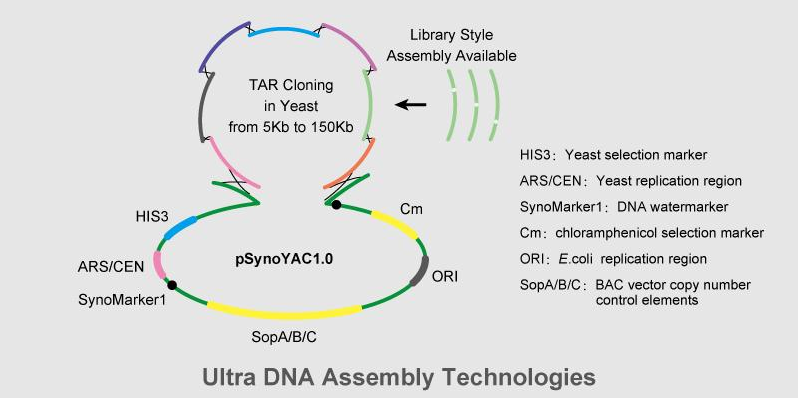In the field of biotechnology, gene synthesis and oligonucleotide synthesis are leading an unprecedented scientific revolution. They are not only the cornerstone of life science research, but also the key force driving the rapid development of biomedicine, gene therapy, synthetic biology and other frontier fields.
Oligo synthesis typically deals with the creation of short, single-stranded DNA sequences ranging from a few to several hundred nucleotides. Gene synthesis, particularly long gene synthesis, entails the assembly of large, double-stranded DNA fragments that can span thousands of nucleotides. While oligonucleotide synthesis relies on straightforward chemical reactions, long gene synthesis necessitates sophisticated strategies to ensure accuracy, scalability, and cost-effectiveness.
Strategies for Long Gene Synthesis
PCR-Based Assembly
PCR amplification is a powerful tool for generating larger DNA fragments from smaller templates. Traditional PCR can be limited by the size and complexity of the target sequence. To overcome this, multi-step PCR protocols, such as overlap extension PCR (OE-PCR) and Gibson assembly, have been developed. These methods allow for the seamless assembly of multiple DNA fragments into a single, larger sequence through overlapping ends and homologous recombination.
Synthetic Biology Approaches
Synthetic biology leverages principles from engineering and computer science to design and build novel biological systems. In the context of gene synthesis, this includes the use of yeast or bacterial artificial chromosomes (YACs/BACs) to clone and propagate large DNA fragments. These systems provide a stable environment for maintaining the integrity of large genes and can support complex genetic modifications.
High-Throughput Automated Synthesis
Advancements in automation have significantly enhanced the efficiency and accuracy of gene synthesis. Automated platforms can synthesize oligonucleotides in parallel, then assemble them into larger fragments using sophisticated algorithms and robotics. These systems minimize human error, improve throughput, and enable the cost-effective production of custom genes.
Next-Generation Sequencing and Bioinformatics
Next-generation sequencing (NGS) technologies have revolutionized the verification and validation of synthetic genes. By sequencing the final product, researchers can quickly identify and correct any errors, ensuring the accuracy of the synthesized gene. Bioinformatics tools play a critical role in this process, facilitating sequence analysis, design optimization, and error prediction.
Challenge of Large Gene Synthesis
Synthesizing large gene fragments is fraught with complexities that significantly elevate the technical demands compared to oligonucleotide synthesis. Here are some of the primary challenges:
-
Error Rates and Fidelity: As the length of the DNA sequence increases, the error rate during synthesis tends to climb. These errors can manifest as insertions, deletions, or substitutions within the sequence, compromising the functionality of the resulting gene. Maintaining high fidelity across extended DNA sequences is thus a paramount challenge.
-
Scalability: Scaling up the synthesis process to produce large quantities of high-quality, long DNA fragments is another hurdle. Traditional methods often struggle with maintaining consistency and yield as the scale of production expands.
-
Cost Efficiency: The cost of synthesizing long genes can be prohibitively high due to the intricate processes and extensive purification steps required. Balancing cost and quality is crucial for making gene synthesis accessible to a broader range of research and industrial applications.
-
Sequence Complexity: Certain DNA sequences, particularly those rich in GC content or containing repetitive motifs, are inherently more difficult to synthesize. These sequences can lead to secondary structures or precipitation, further complicating the synthesis process.
Conclusion
Long gene synthesis is a critical enabler of advancements in synthetic biology, gene therapy, and biopharmaceutical production. While the process presents significant challenges, innovative strategies and technological advancements are paving the way for more efficient, accurate, and cost-effective synthesis of large DNA fragments.
Gene Synthesis |Synbio Technologies
Synbio Technologies stands at the forefront of gene synthesis, offering a comprehensive suite of services that cater to the diverse needs of researchers and industrial clients. Our expertise in this field is underpinned by cutting-edge technology, rigorous quality control, and a deep understanding of the nuances of gene synthesis.
Synbio Technologies is dedicated to providing customers with rapid, precise, and reliable customized gene synthesis solutions. Our state-of-the-art automated synthesis platform ensures high fidelity, scalability, and cost-efficiency. We offer flexible options, including codon optimization, GC content adjustment, and the incorporation of specific restriction sites to suit your research or production requirements.

Synbio Technologies leverages yeast homologous recombination technology to offer comprehensive services for long gene, gene cluster, and small gene synthesis/assembly. We ensure that the delivered plasmids are assembled correctly to meet the needs of experiments and R&D. To uphold the highest standards, we guarantee 100% accuracy on all of our DNA plasmids.

Reference
[1] Gibson DG, Young L, Chuang RY, Venter JC, Hutchison CA 3rd, Smith HO. Enzymatic assembly of DNA molecules up to several hundred kilobases. Nat Methods. 2009 May;6(5):343-5.
 DNA Synthesis
DNA Synthesis Vector Selection
Vector Selection Molecular Biology
Molecular Biology Oligo Synthesis
Oligo Synthesis RNA Synthesis
RNA Synthesis Variant Libraries
Variant Libraries Genome KO Library
Genome KO Library Oligo Pools
Oligo Pools Virus Packaging
Virus Packaging Gene Editing
Gene Editing Protein Expression
Protein Expression Antibody Services
Antibody Services Peptide Services
Peptide Services DNA Data Storage
DNA Data Storage Standard Oligo
Standard Oligo Standard Genome KO Libraries
Standard Genome KO Libraries Standard Genome Editing Plasmid
Standard Genome Editing Plasmid ProXpress
ProXpress Protein Products
Protein Products
























